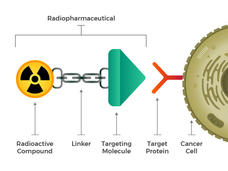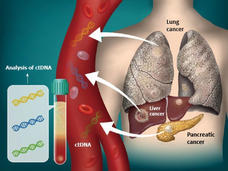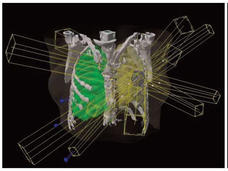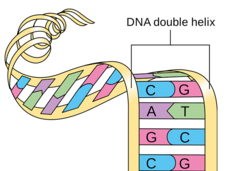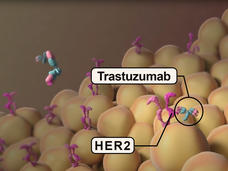Cancer Currents: An NCI Cancer Research Blog
A blog featuring news and research updates from the National Cancer Institute. Learn more about Cancer Currents.
-
Radiopharmaceuticals: Radiation Therapy Enters the Molecular Age
Researchers are developing a new class of cancer drugs called radiopharmaceuticals, which deliver radiation therapy directly and specifically to cancer cells. This Cancer Currents story explores the research on these emerging therapies.
-
Nivolumab Improves Survival for Some Patients with Advanced Stomach Cancer
For some people with advanced stomach cancer, the drug nivolumab (Opdivo) plus chemotherapy may improve how long they live, results from a large clinical trial show. The trial also included patients with gastric cancers that involve the esophagus.
-
For Esophageal Cancer, Immunotherapy Likely to Play Larger Role
For some people with advanced esophageal cancer, the immunotherapy drugs pembrolizumab (Keytruda) and nivolumab (Opdivo) may become part of early treatment for the disease, according to results from two large clinical trials.
-
FDA Approves Blood Tests That Can Help Guide Cancer Treatment
FDA has recently approved two blood tests, known as liquid biopsies, that gather genetic information to help inform treatment decisions for people with cancer. This Cancer Currents story explores how the tests are used and who can get the tests.
-
Large Study Confirms that HPV Vaccine Prevents Cervical Cancer
Widespread HPV vaccine use dramatically reduces the number of women who will develop cervical cancer, according to a study of nearly 1.7 million women. Among girls vaccinated before age 17, the vaccine reduced cervical cancer incidence by 90%.
-
Saying YES: Inspiring a Diverse Generation of Cancer Scientists
Drs. Ned Sharpless and Sanya Springfield highlight NCI’s YES program, which is encouraging young students from underrepresented populations to become interested and engaged in cancer research.
-
A More Treatable Kind of Metastatic Cancer?
People with oligometastatic cancer have only a few metastatic tumors. Researchers are studying whether treating these individual tumors directly with surgery or stereotactic body radiation therapy (SBTR or SABR) can help patients live longer or improve their quality of life.
-
Study Reinforces Treatment Idea for Cancer with Microsatellite Instability
Cancer cells with a genetic feature called microsatellite instability-high (MSI-high) depend on the enzyme WRN to survive. A new NCI study explains why and reinforces the idea of targeting WRN as a treatment approach for MSI-high cancer.
-
Melanoma Cells Are More Likely to Spread after a Stopover in Lymph Nodes
Melanoma cells that pass through the lymphatic system before entering the bloodstream are more resistant to cell death and spread more readily than cells that enter the bloodstream directly. The finding could lead to new treatment approaches.
-
Reducing Cancer’s Global Burden: A Conversation with NCI’s Dr. Satish Gopal
Dr. Satish Gopal, director of NCI’s Center for Global Health, discusses opportunities for making progress against cancer worldwide, particulary in low- and middle-income countries, many of which are seeing increasing cancer incidence and deaths.
-
ACS’s Updated Cervical Cancer Screening Guidelines Explained
Updated cervical cancer screening guidelines from the American Cancer Society recommend HPV testing as the preferred approach. NCI’s Dr. Nicolas Wentzensen explains the changes and how they compare with other cervical cancer screening recommendations.
-
Are Cancer Patients Getting the Opioids They Need to Control Pain?
Efforts to contain the opioid epidemic may be preventing people with cancer from receiving appropriate prescriptions for opioids to manage their cancer pain, according to a new study of oncologists’ opioid prescribing patterns.
-
Pazopanib Shows Promise for Children, Adults with Soft Tissue Sarcomas
For children and adults with advanced soft tissue sarcoma, adding pazopanib (Votrient) to chemotherapy and radiation before surgery may be a promising treatment option, early results from a clinical trial suggest.
-
Many Older Adults Screened Unnecessarily for Common Cancers
Many older adults are being screened for cancer who no longer need to be, a new study shows. Based on a nationwide survey, the study found that at least half of older US adults had received at least one unnecessary cancer screening test in the previous few years.
-
CAR T-Cell Therapy Approved by FDA for Mantle Cell Lymphoma
A CAR T-cell therapy called brexucabtagene autoleucel (Tecartus) has been approved by the Food and Drug Administration (FDA) for some patients with mantle cell lymphoma. This is the third CAR T-cell therapy approved by FDA for patients with cancer.
-
Regular Aspirin Use May Increase Older People’s Risk of Dying from Cancer
Regular use of low-dose aspirin may increase an older person’s risk of being diagnosed with advanced cancer and of dying from cancer, results from the ASPREE clinical trial suggest. Learn more about what this 19,000-participant study found.
-
Having a Heart Attack May Make Breast Cancer Grow Faster
A heart-related event, like a heart attack, may make breast cancer grow faster, a new study suggests. In mice, heart attacks accelerated breast tumor growth and human studies linked cardiac events with breast cancer recurrence, researchers reported.
-
Trastuzumab May Improve Survival in Women with Rare Endometrial Cancer
For some women with HER2-positive uterine serous carcinoma, a rare type of endometrial cancer, treating them with trastuzumab (Herceptin) and chemotherapy may help them live longer, according to updated results from a small clinical trial.
-
Study Offers Insights on Health Problems among AYA Cancer Survivors
A study found that the risk of developing any of 26 chronic health problems was about 50% higher among cancer survivors who were diagnosed as adolescents and young adults, compared with their peers who did not have cancer.
-
Scientists Focus on Fusion Proteins in Childhood Cancers
Fusion proteins drive the development of many cancers in children, yet little is known about their biology. NCI’s Fusion Oncoproteins in Childhood Cancers Consortium brings together experts from varied disciplines to investigate these cancers.

